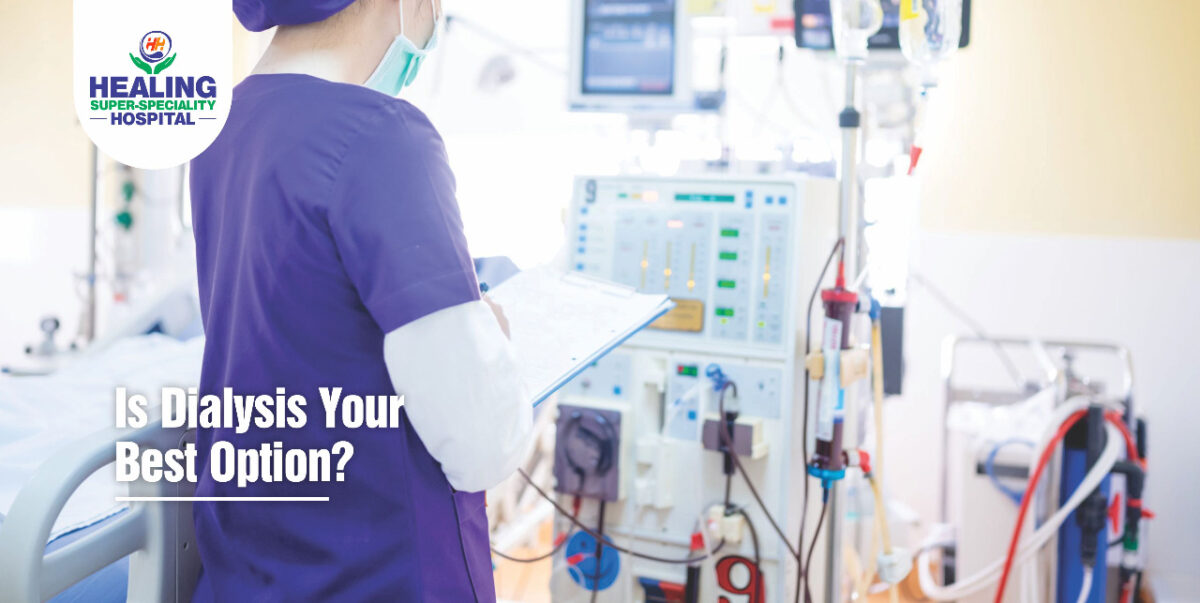The function of kidneys is to filter the blood by removing waste and excess fluid from the body. This waste is sent to the bladder to be eliminated through urine. Dialysis replaces the role of the kidneys when they are no longer functional. Dialysis is a procedure that uses a machine to process and purify the blood.
When your kidneys do not function at the optimum level, dialysis helps in keeping your fluids and electrolytes in check. Treatments like dialysis and kidney transplant are required in end-stage kidney disease. End-stage kidney failure occurs when the functions of kidneys reduce to around 10 to 15% of the normal functioning.
In the case of end-stage renal disease, dialysis is a life-saving procedure that can extend your life.
To understand if dialysis is the best option for you, you need to know what are the risks and alternatives of dialysis and how is life without it. Following is all the information you need to know by the best dialysis centre in Chandigarh:

Types of Dialysis
- Haemodialysis: Haemodialysis is a blood purification procedure that extracts wastes and excess fluid. It can be performed in a dialysis centre or at home. In this procedure, your blood is pumped through soft pipes to a dialysis system, where it passes through a special filter called a dialyzer. Your blood is returned to circulation after the process of filtration is complete.
- Peritoneal dialysis: Peritoneal dialysis is a procedure that can be performed anywhere. However, it must be done on a regular basis. A catheter is inserted into the abdomen for this procedure. Peritoneal dialysis cleans the blood from inside your body rather than from outside.
- Continuous renal replacement therapy (CRRT): This treatment is usually used in the ICU for patients who are suffering from acute kidney failure. Blood is pumped into tubes by a machine. The waste products and water are then removed by a filter. The blood, along with replacement fluid, is returned to the body.

Risks Associated with Dialysis
Disadvantages of Haemodialysis are as follows:
- Anaemia can be caused by low blood pressure.
- Itching, muscle cramps, and trouble sleeping are common discomforts.
- Accumulation of high potassium levels in the blood.
- Sudden cardiac death, caused by an irregular heartbeat, is the leading cause of death in dialysis patients.
- When on dialysis, there could be restrictions on what you can eat and drink.
Disadvantages of Peritoneal dialysis are as follows:
- Weakness in the abdominal muscles.
- The dextrose in the dialysate causes a spike in blood sugar.
- Weight gain is a common side effect.
- Peritoneal dialysis can lead to problems like stomach ache, hernia and fever.
- For people with diabetes, controlling blood glucose can be more difficult.
- There is a risk of infection in the catheter.
Disadvantages of CRRT are as follows:
- CRRT may lead to bleeding.
- There are higher chances of hypothermia.
- It can lower the blood pressure
- It can disturb the electrolyte balance.
- Renal regeneration is delayed.
- Bones get to deteriorate.
Life without Dialysis
End-stage renal disease is a life-threatening condition. In such a case, dialysis can help you live longer and improve your quality of life. However, the benefits may not be as great for elderly people or those with multiple medical issues. Dialysis can be problematic due to factors such as advanced age, frailty, serious dementia, heart disease, or cancer.
If the life expectancy of the patient is short, dialysis can impair the quality of the remaining life.
Alternatives of Dialysis
There are other treatments or rather preventions that might be able to help you if you decide to not go for dialysis. Some of the prevention/alternatives are as follows:
- Get an EPO injection once a week to help with anaemia control. The hormone erythropoietin (EPO) is released naturally in the body when the kidneys are functioning properly.
- Drink plenty of water to prevent dehydration.
- Before taking any anti-inflammatory medications, such as ibuprofen or diclofenac, consult the doctor.
- Maintain the right blood pressure level to help the kidneys last longer.
Apart from taking these precautions, a kidney transplant is another option. However, a kidney transplant can cause complications if the patient is overweight, suffering from a mental health condition or smokes and drinks alcohol heavily.
Looking for the best dialysis centre in Chandigarh? Click here to know all about it: https://healinghospital.co.in/best-kidney-hospital-in-chandigarh/

























